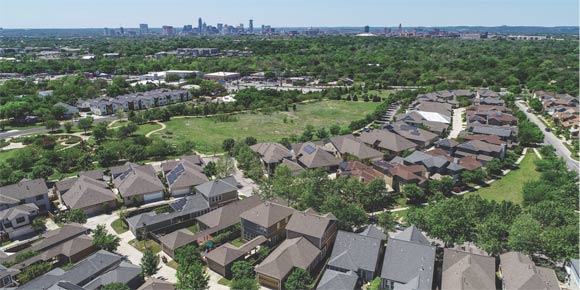By Todd Lewys
It’s a question that countless home buyers grapple with as they contemplate where they want to purchase a home.
That question? Should I buy a home in an urban, or suburban community?
It’s a good question, and a highly personal one at that. Ultimately, the choice you make is determined by two factors.
The first factor is the type of lifestyle you envision? The second factor — and this is a significant one — is, what stage of life are you presently in?
For example, if you’re in your mid-twenties, environmentally-conscious and have secured your first job working for a firm downtown, then urban living is likely to appeal to you.
Why? Simple.
You can walk, bike or take public transit to work in a matter of minutes, a host of amenities (coffee shops, restaurants, shops, stores) are at your fingertips and you can enjoy a mature, walkable area that’s loaded with character. During the evening, the area also comes alive with vibrant nightlife.
That said, living in an urban setting — Osborne Village is a prime example — can also have its downsides.
Accommodations – while trendy — tend to be pricier.
Not only that, but there’s a good chance you’ll pay top dollar for a condo that, while stylish, is (ahem) on the small side.
And if you do find an affordable (likely older) condo, it may not have a balcony to venture out on to, leaving you with no outdoor space for your barbeque and outdoor furniture.
Still, you can console yourself with the knowledge that you’re limiting your carbon footprint by walking to work, and that you’re in the middle of all the action — right where you want to be.
Those who don’t enjoy being in the middle of all the action – i.e., the hustle and bustle of being downtown, constant traffic and the noise that comes part and parcel of living in a happening area – might want to look at living in a suburban area.
Again, it all comes down to lifestyle.
Perhaps you work downtown, and want to get away from the
hectic traffic and noise at the end of a long work day.
If that’s the case, a suburban community could be for you.
For starters, you’ll have more personal space to enjoy with your own yard and a larger home.
Next, if you have kids, suburban areas tend to be more family-friendly. Because they’re relatively isolated (Bridgwater Forest and Sage Creek are good examples), they tend to be safer, and offer parks for kids to play in just minutes from home.
Likewise, your kids — and their friends — can also play in your backyard, or downstairs in your basement’s rec room. That’s a luxury you won’t find in a 600 sq. ft. condo in an urban community.
Of course, there are downsides associated with suburban living, too.
Because there’s a good chance you’ll be a fair distance from your workplace, there will be the grind of a grueling daily commute to deal with. Doubtless, you’ll be spending more time in your car.
Wear and tear on your vehicles (with most moms and dads working these days) will also be an issue, so you’ll need to figure more money into your budget for car repairs.
And don’t forget you’ll have to drive the kids longer distances to their activities on a regular basis.
However, there is a payoff at the end of a long day: you have a quiet, spacious refuge to return home to — a place where you can commune with your family and rejuvenate.
In the final analysis, choosing an urban or suburban lifestyle – and, hence, a home in such a setting — is highly personal.
Consequently, carefully assess your current stage of life. Then, take the time to envision the lifestyle that you want to pursue.
Once you’ve done that, enlist the services of a
reputable Realtor.
They will be more than happy to help you find the right home – and area – for you to put roots down in.



